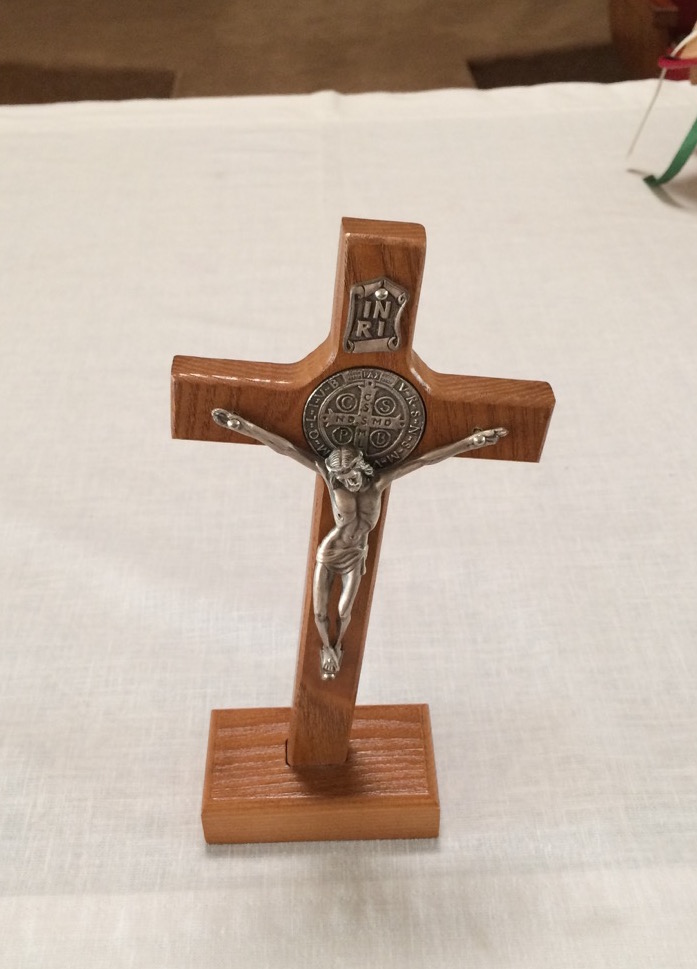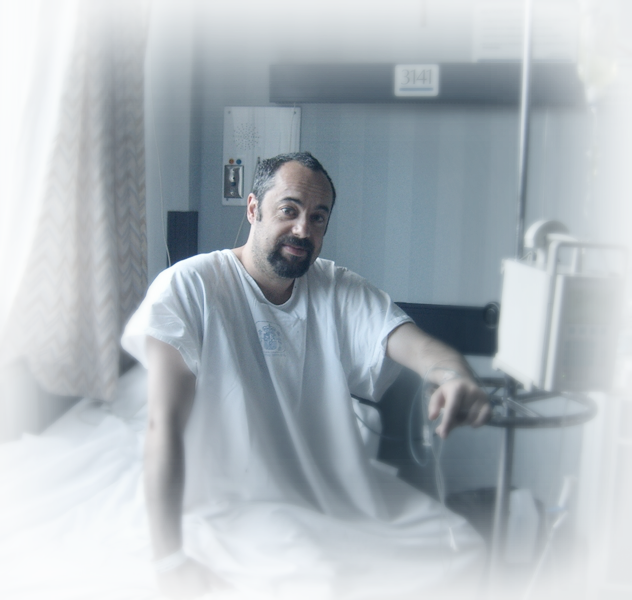The Newman Center, which my wife runs, has a weekly Mass on Wednesday evenings. Last week, just before communion a strange voice came over the chapel loudspeaker. It was quick—just two syllables, which I didn’t find too intelligible. Everyone looked around and wondered where the voice had come from. No one was near any microphone. There was no iPod plugged into the system. There was no explanation for this mysterious voice. As we looked around at each other for some explanation, feeling the chill of, perhaps, some spirit, I noticed that we were distracted from what was just about to take place: communion. Afterwards we checked the building for an intruder and then began to socialise and have dinner. But the conversation about the strange voice continued. Some students thought it said, “stay away.” Sarah and I were a bit freaked out since we live in the Newman Center, and so we took extra care in locking up that night!
 Saint Ignatius believed in the existence of the evil spirit, which he usually referred to as “the enemy”. Evil is in constant battle with good, trying to derail us in our spiritual life. But Ignatian spirituality typically applies this to our interior battles, sometimes forgetting the exterior. We talk freely about finding God in all things, how God uses our experience in the physical world to communicate to us interiorly. But the same can be applied to the evil spirit. Perhaps the voice over the chapel loudspeaker could be explained away by some coincidental radio interference, but it doesn’t rid us of what happened within us: fear, a chilling feeling, and even distraction from the Eucharist. Just as the good spirit can use an event to produce goodness, consolation, and hope, the evil spirit can use an event to produce within us fear, desolation, and hopelessness.
Saint Ignatius believed in the existence of the evil spirit, which he usually referred to as “the enemy”. Evil is in constant battle with good, trying to derail us in our spiritual life. But Ignatian spirituality typically applies this to our interior battles, sometimes forgetting the exterior. We talk freely about finding God in all things, how God uses our experience in the physical world to communicate to us interiorly. But the same can be applied to the evil spirit. Perhaps the voice over the chapel loudspeaker could be explained away by some coincidental radio interference, but it doesn’t rid us of what happened within us: fear, a chilling feeling, and even distraction from the Eucharist. Just as the good spirit can use an event to produce goodness, consolation, and hope, the evil spirit can use an event to produce within us fear, desolation, and hopelessness.
Tools for reorienting us to God
On the night of the mysterious voice Sarah and I felt the need to pray. We prayed Night Prayer (from the Liturgy of the Hours), which includes psalms about darkness and taking refuge in God. That night was Psalm 143: “Rescue me, Lord, from my enemies; I have fled to you for refuge.” And the reading was from 1 Peter 5:8-9a: “Stay sober and alert. Your opponent the devil is prowling like a roaring lion looking for someone to devour. Resist him, solid in your faith.” It was just what we needed. In that moment we were grateful for scripture like this, written by those who recognised the effects the evil spirit has on one’s heart. We even prayed the prayer to St Michael the Archangel, which I was never a fan of because I felt it was overly dramatic and focused too much on evil. But in this moment of fearing evil, I was grateful we had it.
St. Michael the Archangel,
defend us in battle.
Be our defense against the wickedness and snares of the Devil.
May God rebuke him, we humbly pray,
and do thou,
O Prince of the heavenly hosts,
by the power of God,
thrust into hell Satan,
and all the evil spirits,
who prowl about the world
seeking the ruin of souls. Amen.
 “The chapel needs an exorcism,” I told Sarah. The next day Sarah went around the chapel and sprinkled holy water. As she did, she noticed the small crucifix we had on the altar. It was shifted in its base and was now leaning at an angle. The priest had dropped it the previous day at Mass, which could have been the cause, but Sarah could not shift it back to an upright position. She pulled at it and even tried to hammer it back but it wouldn’t budge. And the priest dropped the crucifix on carpet. There was no way it could have shifted like that when dropped on a soft surface. We started freaking out a little bit more. When I later went to see the crucifix I was fairly easily able to shift it back to a straight position. Sarah was dumbfounded.
“The chapel needs an exorcism,” I told Sarah. The next day Sarah went around the chapel and sprinkled holy water. As she did, she noticed the small crucifix we had on the altar. It was shifted in its base and was now leaning at an angle. The priest had dropped it the previous day at Mass, which could have been the cause, but Sarah could not shift it back to an upright position. She pulled at it and even tried to hammer it back but it wouldn’t budge. And the priest dropped the crucifix on carpet. There was no way it could have shifted like that when dropped on a soft surface. We started freaking out a little bit more. When I later went to see the crucifix I was fairly easily able to shift it back to a straight position. Sarah was dumbfounded.
Neither of us are superstitious people, but in our situation we were sure glad for those tools the church provides us with: scripture, prayer, and holy water. Those things helped focus us back onto God and away from any feeling of evil. They reminded us that it is God in whom we take refuge; it is God who protects us. After recounting the story to some friends, one of them told us a story about a time, soon after she became Catholic, that she decided not to attend Mass because of some friends who were in town. Right at the time Mass began the crucifix on her wall fell off and broke in two.
It’s about the effect, not the event
As human beings we try to place explanation on seemingly strange events. Whether a falling crucifix or a mysterious voice on a loudspeaker were caused by the enemy or not, it’s how the evil spirit causes us to respond those events that matters. Do we allow them to distract us from God, or can they remind us of how desperately we need God and must rely on God’s refuge? The church offers us things like prayer, scripture, and sacramentals to help us reorient our focus toward God, who offers us consolation and hope. I don’t think Ignatius wanted us to dwell on evil. I think he wanted us to simply be aware of how the evil spirit provokes us so we can be ready to take refuge in the love and goodness of God.
Related posts:
Listen to an audio version of this post…
Music by Kevin MacLeod









Andy, Can you accept that God was that voice? Can you accept that by those words He led you to recite Compline and to write this blog to draw the attention of all your followers to the fact that God is with us all now and forever? That we may (no, must) rely upon Him in every case of doubt and fear. God is the rock on which our faith and our life is built
Great post, Andy. I pray the St. Michael prayer at least once a day, usually as part of an examination of conscience. I call to mind my sins small and large and ask St. Michael and the other archangels to protect me from the enemy’s influence so I can avoid those sins in the future.
Also, let’s make sure we put the battle between evil and good in its proper perspective. As C.S. Lewis points out, it’s not a battle between the enemy and God; it’s a battle between the enemy and St. Michael. God has already won the battle over evil. It’s our challenge to remain faithful to that victory without letting evil distract or overcome us.